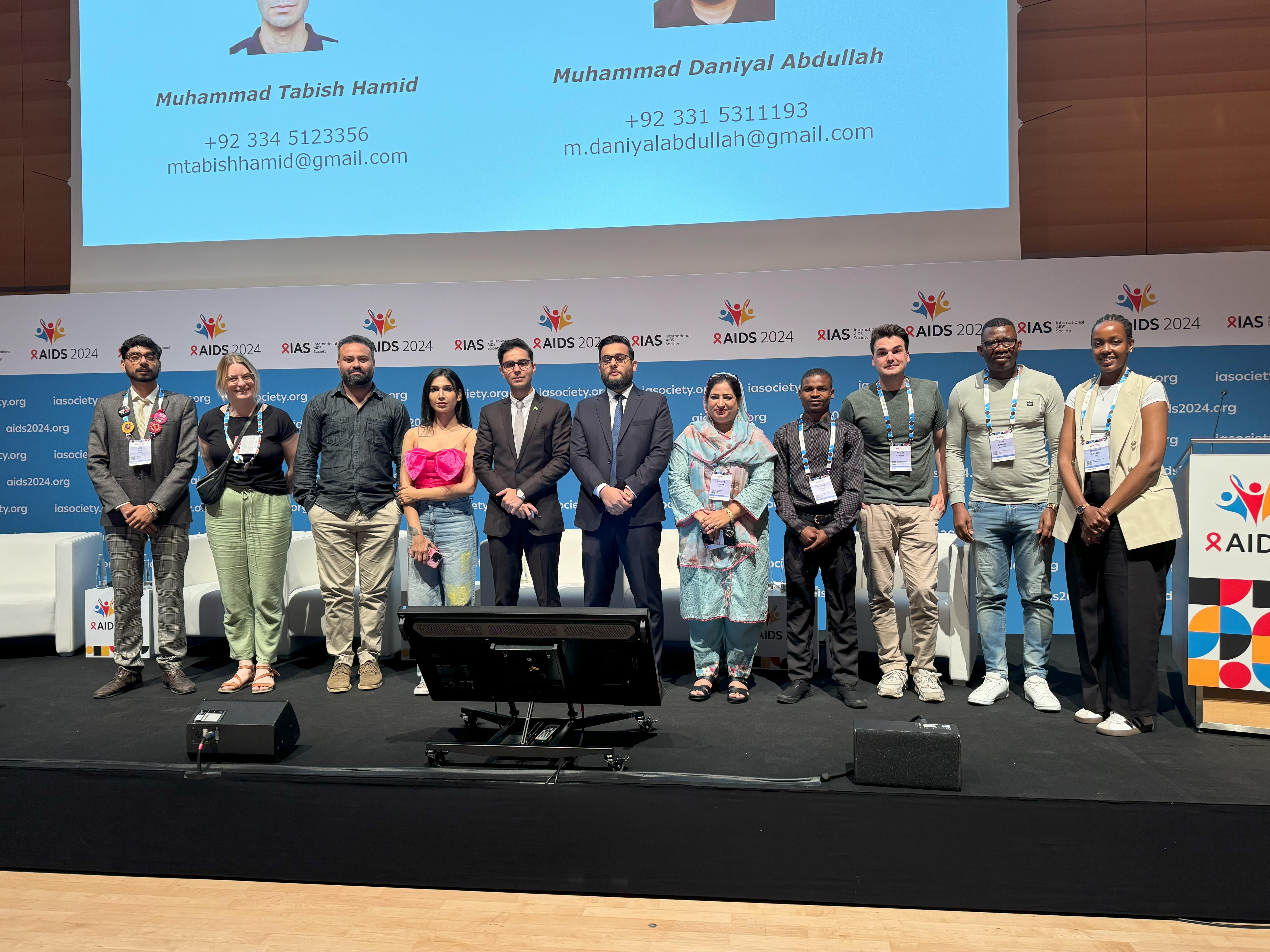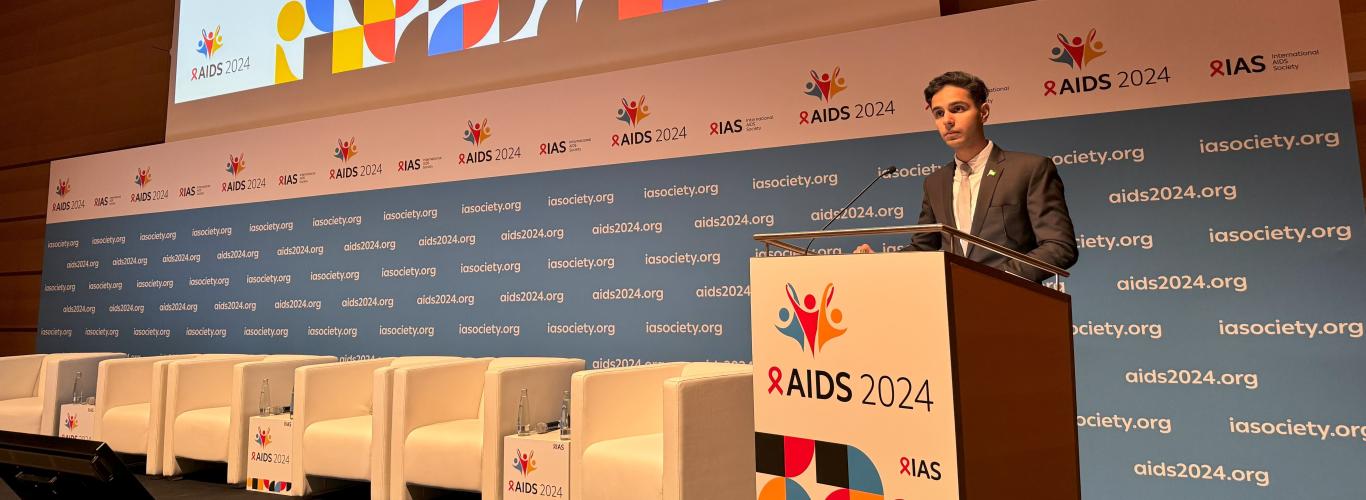From Local to Global: Tabish Hamid’s Path to Transforming Public Health and Policy
We recently had the pleasure of speaking with Muhammad Tabish Hamid, a BSc Economics and Politics '24 graduate from the Mushtaq Ahmad Gurmani School of Humanities and Social Sciences. A distinguished advocate for youth-related issues, public health, and policy, Tabish’s journey began with a deep commitment to community service and public sector understanding, especially for the young. His focus on integrating disaster management with AIDS care gained him international recognition, including the opportunity to represent Pakistan at a global conference. In our conversation, Tabish shared how his diverse experiences have shaped his innovative approach to public health and making a global impact.
How did your journey with public health and public policy start?
My interest in public health and public sector began in high school when I volunteered with non-profit organisations, primarily Alkhidmat Foundation, Y-PEER, and Young Leaders Society – Pakistan (YLS-P). These experiences gave me insights into public sector operations. I also interned with the District Administration of Islamabad and the Federal Ministry of Education and Professional Training, which deepened my understanding of government systems and their reliance on community-based organisations for problem-solving and policy implementation.
Did you enter LUMS knowing that this is what you wanted to study?
Not exactly. During my freshman year, the pandemic prevented my batch from attending campus in-person. While disappointing, this situation presented exciting opportunities. With extra time on my hands, I laid the foundation of a much-needed youth organisation, YLS-P, focusing on youth development and related issues. Furthermore, I completed two long internships with the government of Pakistan, offering firsthand insight into the bureaucracy, government operations, and the role of community-based organisations in supporting them, from problem-solving to policy implementation. This eye-opening experience revealed how different institutions within the governance structure interact with each other to form a public policy framework, and ultimately led to the formation of LUMS Student Policy Research Initiative (LSPRI). The core idea behind it was to create a forum for data-driven research to assist the public sector.
How did you transition from government work to community-based organisations and public health?
The 2022 floods in Pakistan were a pivotal moment for me. While working at YLS-P, and volunteering with Y-PEER and Alkhidmat Foundation, I witnessed the devastating impact of the floods, particularly on impoverished communities. This experience sparked my interest in disaster management and disaster risk reduction (DRR). My involvement with Alkhidmat Foundation and a workshop on STDs and HIV care further shaped my focus.
Can you share what your most recent project entailed and what you presented?
I co-founded LSPRI during my sophomore year and served as its President in my senior year. Through LSPRI, I connected with policy practitioners, public policy consultants, bureaucrats, and politicians. This led to a research study on disaster management, which I conducted along with Mr. Muhammad Daniyal Abdullah, a public policy consultant. We were invited to present out findings at the IAS AIDS2024 Conference in Munich, Germany. We were not only got selected but also awarded a scholarship to attend and present in-person. The conference included various segments, including engagement and entertainment activities. At its core were workshops conducted by organisations such as the Gates Foundation and DRR units from different countries, addressing specific niches to advance AIDS care in their respective area.
My workshop focused on integrating disaster management with AIDS care, using the 2022 floods as the primary case study. In Pakistan, the National Institute for Health (NIH) effectively controls the spread of HIV and ensures proper treatment and nutrition for those affected. However, during a disaster like a flood, the infrastructure is disrupted, complicating the NIH’s efforts to track and treat individuals. As AIDS care requires adherence to specific treatment cycles, and disruptions can quickly escalate into crises, our findings highlighted a culturally and regionally tailored framework to be integrated in the disaster relief efforts.
What inspired you to focus on integrating HIV services into your work, and how can this approach change public health crises?
Integrating HIV care is about creating a framework applicable to various health challenges, particularly for vulnerable populations. This approach can be extended to other health crises, like those caused by climate change and natural disasters. Despite limited resources, the response to the 2022 floods in Pakistan showed extraordinary community support and resource management. An integrated framework for managing health crises can enhance resilience and effectiveness in addressing diverse health challenges.
What does it mean to you to represent Pakistan on such a prominent global stage?
Representing Pakistan at the conference and being the youngest workshop presenter was both an immense honour and a responsibility. Speaking to a diverse audience of medical professionals, academics, and activists was a significant opportunity, and required thorough preparation and a deep understanding of the topic. It was gratifying to contribute meaningfully and enhance Pakistan’s reputation.
What are your current projects and future plans?
Currently, I am balancing entrepreneurial ventures with my role as the president of YLS-P. Our initiatives include political activism and the ‘Education for All’ campaign, which involves conducting workshops on leadership, identity, and public speaking across schools and universities. This project also incorporates sexual education and HIV awareness. In addition to this role, I am also involved in strategic advisory for YLS-P, which continues to grow and expand its projects.
How did your experience at LUMS prepare you for leadership roles?
At LUMS, I explored opportunities in entrepreneurship and volunteer work, even creating new ones like LSPRI, a public policy initiative. Despite initial scepticism due to our academic load and lack of a 'fun' element, we were surprised by the overwhelming interest. LUMS' resources and support demonstrated that students can achieve remarkable things and make a meaningful impact.
It's truly all about creating your opportunity and leading the way in a field you are passionate about.
Absolutely. There is a vast world of opportunities awaiting us, especially for those of us who are underrepresented internationally. Despite the presence of 22 UN agencies in Pakistan addressing various issues, there remains a significant need for greater youth representation at international conferences, in government, and on campuses. Enhancing this representation will empower and educate our youth, opening doors for impactful work both locally and globally. Universities like LUMS and youth organisations must actively seek and present these opportunities to the younger generation. Leadership and passion can lead to impactful work, and I encourage others to explore and create their own paths in their areas of interest.
What advice would you give to young researchers or students passionate about making a difference in public health?
Making a difference requires genuine passion and perseverance. Start by engaging in volunteering or community-based projects, even if they are not directly related to your field of interest. My journey began with various public policy projects, eventually leading to a focus on public health. Participation in initiatives like LSPRI can provide valuable experience and direction. Follow your interests, stay committed, and leverage opportunities to create impactful work.
























